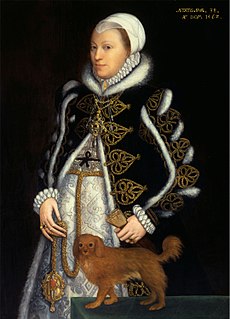Related Research Articles

Viscount Knollys, of Caversham in the County of Oxford, is a title in the Peerage of the United Kingdom. It was created in 1911 for the court official Francis Knollys, 1st Baron Knollys, Private Secretary to the Sovereign from 1901 to 1913. He had been previously created Baron Knollys, of Caversham in the County of Oxford, on 21 July 1902. His son, the second Viscount, served as Governor of Bermuda. As of 2012 the titles are held by the latter's son, the third Viscount, who succeeded in 1966. The third Viscountess Knollys is a sister of Baron Farnham: she served as Vice Lord-Lieutenant of Norfolk.

Sir Richard WingfieldKG of Kimbolton Castle was an influential courtier and diplomat in the early years of the Tudor dynasty of England.

Catherine Carey, after her marriage Catherine Knollys and later known as both Lady Knollys and Dame Catherine Knollys,, was chief Lady of the Bedchamber to Queen Elizabeth I, who was her first cousin.

Earl of Banbury was a title in the Peerage of England. It was created in 1626 for William Knollys. He had already been created Baron Knollys in 1603 and Viscount Wallingford in 1616, both in the Peerage of England. However, the paternity of his sons was challenged, leading to hundreds of years of dispute.
Knollys, Knolles or Knowles, the name of an English family descended from Sir Thomas Knollys, Lord Mayor of London, possibly a kinsman of the celebrated general Sir Robert Knolles. The next distinguished member of the family was Sir Francis Knollys or Knowles, English statesman, son of Sir Robert Knollys, or Knolles, a courtier in the service and favour of Henry VII and Henry VIII. Robert had also a younger son, Sir Henry, who took part in public life during the reign of Elizabeth I and who died in 1583. From the time of Sir Francis, the family were associated with Greys Court at Rotherfield Greys and Caversham Park, then in Oxfordshire, as well as the nearby town of Reading in Berkshire, where the family's private chapel could once be seen in the church of St Laurence.
Robert Knollys may refer to:

Sir Francis Knollys, KG of Rotherfield Greys, Oxfordshire was an English courtier in the service of Henry VIII, Edward VI and Elizabeth I, and was a Member of Parliament for a number of constituencies.

Sir Robert Cotton, 1st Baronet was an English politician. He was Member of Parliament (MP) for Cheshire from 1679 to 1681 and from 1689 to 1702.

Sir Thomas Knollys or Knolles was an English businessman in London who was active in both local and national government.

There have been two baronetcies created for the Knowles family, originally a branch of the Knollys family known as Knollys of Stanford. One is in the Baronetage of Great Britain, which is extant, and one in the Baronetage of the United Kingdom, which is extinct.

Hanserd Knollys (1599–1691) was an English particular Baptist minister.
Sir Ambrose Cave was an English politician.
Sir Francis Knollys of Reading Abbey, Berkshire was an English privateer and politician who sat in the House of Commons at various times between 1575 and 1648.
Sir Henry Knollys of Kingsbury, Warwickshire was an English courtier, privateer and Member of Parliament.
There have been two baronetcies created for persons with the surname Knollys, one in the Baronetage of England and one in the Baronetage of Great Britain. Both creations became extinct on the death of the first holder.
Sir Robert Knollys KB was an English courtier and politician who sat in the House of Commons at various times between 1572 and 1611.
Richard Knollys was an English Member of Parliament.
Henry Knollys, of Grove Place, Nursling, Hampshire, was a British politician who sat in the House of Commons from 1722 to 1734.
Henry Knollys of Downton, Hampshire, was a parliamentarian in England.
William Knollys, known as Viscount Wallingford, of St George's, Hanover Square, Westminster, was a British Army officer and politician who sat in the House of Commons from 1733 to 1740.
References
- ↑ "KNOLLYS, Henry I (bef.1521-83), of Milverton, Som. and the Blackfriars, London. - History of Parliament Online". Historyofparliamentonline.org. Retrieved 1 March 2019.CS1 maint: discouraged parameter (link)